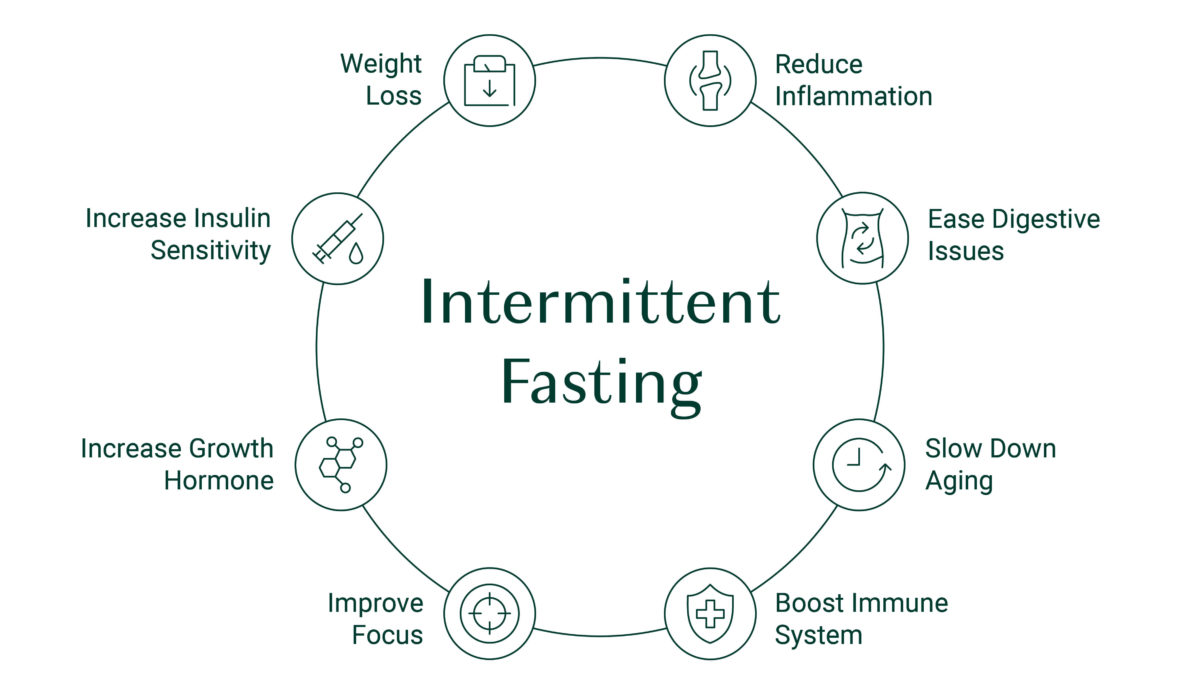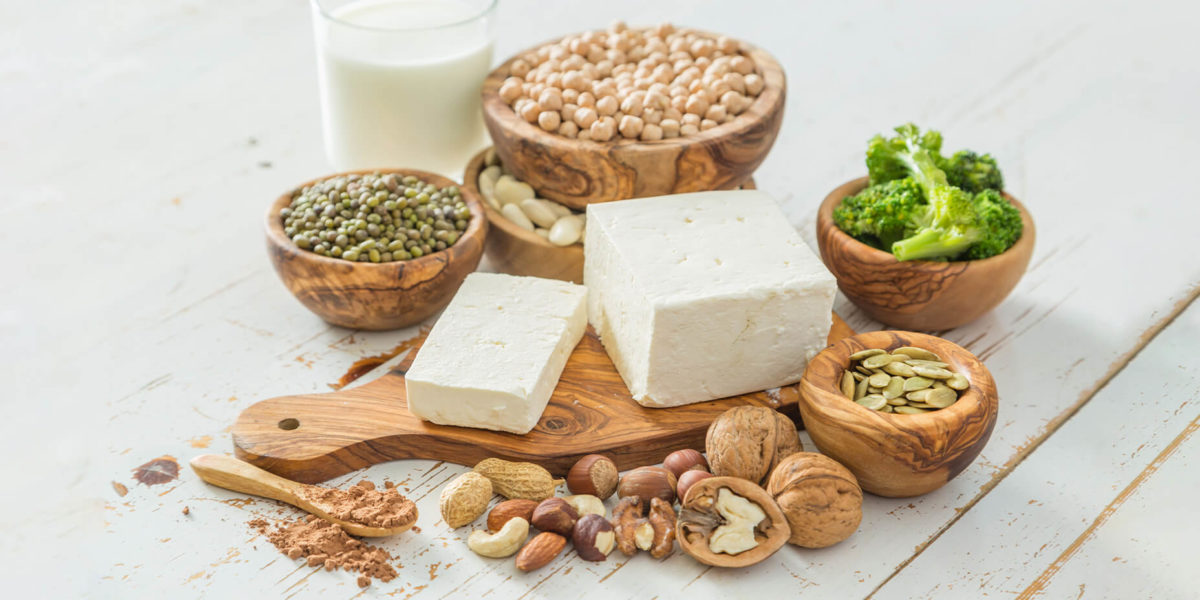Intermittent fasting is becoming a popular dietary strategy for weight loss, blood glucose regulation, autophagy (recycling of old or damaged cell parts), and several other processes related to health and longevity.
What most people don’t realize, however, is that intermittent fasting can also help maintain healthy bones as you age.

What Is Intermittent Fasting?
Intermittent fasting is a dietary protocol that switches the typical “eat all day long” schedule to one in which you give your body a break from digesting and absorbing food by eating only during specific windows of time.
For the most part, as soon as people wake up, they begin an all-day feast. First, there’s breakfast, then snacks, then lunch, perhaps a bit of grazing through the afternoon, then a large dinner, and a snack before bed.
We’re incredibly blessed to have so much food available to us, but the downside is that our bodies rarely get a chance to stop digesting and switch over to what’s called a “fasted state”.
Why does this matter? Because when your body is allowed to fast (i.e., there is no food coming in, and all the nutrients from your last meal have been processed), your metabolism switches over to repair and renew mode. Your ancestors would have spent a significant amount of time in the fasted state, but today it’s up to you to carve out space in your day to allow your body to fast – which is the entire premise of intermittent fasting.
While you can follow several different types of intermittent fasting protocols, the most popular is the 16:8, where you fast for 16 hours each day and consume your meals within an 8-hour window. An example would be having breakfast at 11 am and then finishing dinner by 7 pm.

What Happens When You Eat?
To fully grasp the benefits of intermittent fasting, it’s first helpful to understand what happens in your body when you eat.
When you eat, the nutrients in your foods (fat, protein, and carbohydrates) create a cascade of events that stimulates the release of hormones and other digestion-enhancing compounds. This shifts you into a “fed state” as your body turns its attention to breaking down, absorbing, utilizing, or storing the nutrients you’ve just provided.
For a brief breakdown:
- Carbohydrates are broken down into glucose, readily enter your blood, and can be used for energy if your body requires fuel. Any excess glucose is first stored in your muscle and liver, then converted to fatty acids and added to fat cells.
- Fat is broken down and then repackaged into structures called chylomicrons. These structures move through your body, slowly releasing fat and aiding in the absorption and distribution of fat-soluble vitamins (Vitamins A, D, E, and K). Fat plays a vital role in the structure of your cell membranes, along with the production of hormones and other critical biochemicals.
- Protein gets broken down into amino acids, which are the building blocks of enzymes, hormones, neurotransmitters, and more. These nutrients are vital to the maintenance of every system in your body, so upon absorption, they’re sent around to your different tissues, glands, and organs to be incorporated into new proteins that will serve their specific functions. Due to the specificity of their actions, amino acids are your body’s last resort when it comes to fuel.
If it sounds like a lot of work, that’s because it is. When you’re in the fed state, your entire system is all hands on deck, working with the nutrients you’ve provided. And at the helm is insulin, the hormone that’s responsible for ushering nutrients out of your blood and into your cells. It takes around six hours for insulin levels to finally drop, and when this happens, your body switches gears and starts running on the glucose you stored in your liver and muscle cells. After about 12 hours, your body runs out of stored glucose, and that’s when you begin to tap into your fat stores for fuel.
At this point, your body is no longer dealing with incoming nutrients, and the focus shifts from digestion mode to repair mode. During this time, damaged cells and cellular debris are removed, inflammation calms down, and regenerative processes ramp up.
What About Breakfast?
You’ve likely been told that breakfast is the most important meal of the day – but what is breakfast anyway? Breakfast means “breaking fast,” which is what you’ll be doing when you follow intermittent fasting, except instead of breaking your fast at 7 am or 8 am, you hold off for a few hours.
A common misconception is that you need breakfast to get your engines running in the morning, but your body’s internal clock (circadian rhythm) does this for you naturally by increasing levels of cortisol and other hormones that help to wake you up and get your metabolism going.
Upon eating your breakfast, whether that be at 7 am, 11 am, or even later, your body moves out of a fasted state into the insulin-dominant fed state. Once this happens, you’re no longer in repair and rejuvenation mode; you’re in digestion mode.
And for all the coffee lovers out there that can’t imagine crawling out of bed without their morning cup – no worries, coffee won’t kick you out of your fasted state. You can even add some high-fat cream and stay technically “fasted.”

Benefits of Intermittent Fasting
Now that you understand some of the physiological changes that happen in the fasted vs. fed state, let’s take a look at how these changes can benefit you in the short and long term.
Research shows that intermittent fasting can[1][2][3][4][5]:
- Make your body more sensitive to insulin, helping to control your blood sugar levels throughout the day.
- Reduce inflammation and risk for type two diabetes.
- Reduce body fat, helping you burn off adipose tissue (fat tissue), especially around the abdomen.
- Boost metabolism, helping you burn more calories throughout the day
- Lower triglycerides, LDL cholesterol, and blood pressure
- Enhance your resilience and ability to respond to stressors by acting as a low-level stressor
- Increase overnight production of human growth hormone
- Improve circadian rhythm, which improves all aspects of metabolism, including sleep, energy, satiety, and weight control
- Increase a process known as autophagy, which is your body’s self-cleaning system, breaking down and either recycling or eliminating old cellular parts
- Increase your “metabolic flexibility,” allowing you to switch back and forth from using fat and glucose as your primary sources of fuel. This has a significant impact on longevity because as you age, you tend to become more insulin resistant, and therefore your body begins to rely more heavily on fat for fuel
- Extend your lifespan due to all of the above factors, which can help to mitigate diseases of aging
How Does This Apply to Your Bones?
If we were to boil down the benefits of intermittent fasting to one simple explanation, it would be this:
Intermittent fasting prolongs the amount of time your body spends in repair and renewal each day, which means your body gets more time to rejuvenate itself on the cellular, tissue, and organ level. More time to repair benefits every system in your body, and your bones are no exception.
Here are some ways that intermittent fasting specifically assists with bone health:
Bone Remodeling
The bone remodeling process requires a delicate balance of bone-building cells (osteoblasts) and bone-resorbing cells (osteoclasts). When osteoclasts outpace osteoblast activity, you experience more bone breakdown than rebuilding, resulting in weaker bones with less density.
One factor that increases osteoclast production and activity is inflammation, specifically pro-inflammatory chemicals called cytokines. Furthermore, cytokines can inhibit osteoblast activity, which creates a double whammy for bone loss. When you fast, however, it reduces inflammation and inflammatory chemicals and therefore helps preserve a healthy balance between osteoblast and osteoclast activity. .
Improves Fat Utilization
Fasting improves your body’s ability to burn fat instead of glucose. This results in general weight loss and specifically targets abdominal obesity (visceral fat). Your visceral fat is highly inflammatory, which means that when you burn away excess fatty tissue in your abdomen, you also decrease the number of inflammatory chemicals circulating through your body.
Furthermore, excess belly fat is associated with lower levels of vitamin D and osteocalcin (the enzyme that carries calcium to your bones) and higher insulin levels and parathyroid hormone (PTH). When PTH is high, it activates osteoclasts to break down bone and release calcium into the bloodstream. This means that belly fat simultaneously reduces calcium deposition in your bones while also increasing its loss into your bloodstream.
Increases Bone Reformation
As you’ve learned by now, fasting enhances all forms of growth and repair in your body. Your bones are constantly going through a breakdown and rebuilding process. When you fast, you enhance the rebuilding phase by stimulating osteoblast activity and increasing new bone formation[6].
Who Should NOT Try Intermittent Fasting (IF)?
Everyone’s body is unique, and while IF can benefit many people, it isn’t the best choice for everyone. Depending on your age and current health status, you may find IF is not the best option. Groups of people who should not try IF include:
- Children and adolescents who are still growing
- Individuals with anorexia or who are at increased risk for developing an eating disorder
- Pregnant and nursing women
- Older frail adults
- Anyone taking medication that must be taken with food or who are medically advised not to fast by their doctor for other reasons.
For people with chronic health conditions, IF may be an option, but only under the supervision and with the approval of your healthcare practitioner. For example:
- Individuals with type 1 or type 2 diabetes
- Individuals with chronic diseases, including coronary artery disease, unstable angina, heart failure, atrial fibrillation, prior myocardial infarction, prior stroke or transient ischemic attack, most cancers, chronic obstructive pulmonary disease, pulmonary embolism, asthma, peripheral vascular thromboembolism, and chronic kidney disease.
Dietary Recommendations for Intermittent Fasting
Technically, no dietary recommendations go along with intermittent fasting because this protocol is structured around when you eat, not what you eat. However, your goal is optimal health and wellness, so the type of food you introduce into your body is crucial, as well as the macronutrient ratio that you follow. At the end of the day, you are what you eat, and the food on your plate becomes the material used to create and maintain every cell in your body.
Furthermore, the best outcomes for weight loss (fat loss without muscle loss), improved energy, sleep, and growth hormone production have been seen when carbohydrates provide 25-35%, protein 15-30%, and fats 35-50% of the diet’s calories.
With this in mind, below are dietary recommendations for each food group:
Carbohydrates
Keep your carbohydrate intake to no more than 35% of your calories and focus on:
- Non-starchy vegetables like broccoli, spinach, zucchini, kale, asparagus, mushrooms, onion, brussels sprouts, peppers, cauliflower, etc.
- Starchy vegetables (in moderation), including sweet potato, butternut squash, spaghetti squash, taro, yams, parsnips, and so on.
- Beans and lentils (in moderation)
- Whole grains (in moderation), including buckwheat, quinoa, rice, oats, millet, amaranth, farro, corn, etc.
- Whole fruits (in moderation), including avocado, dates, tomatoes, citrus fruit, apples, pears, berries, nectarine, peaches, watermelon, etc.
Protein
Protein should account for 15-30% of your daily calories. Protein needs will be at the higher end of this range if you are older, physically active, working to build muscle, or recovering from an illness. For your protein, focus on:
- Plant sources like beans and legumes, tofu, hemp seeds, lentils, tempeh, chia seeds, pumpkin seeds, nuts, mycoprotein, and soybeans.
- Animal sources like fish, lamb, beef, chicken, pork eggs, cottage cheese, and Greek yogurt.
Healthy Fats
Healthy fats should provide 35-55% of your daily calories.
- Healthy monounsaturated fats from avocados, olives, and extra virgin olive oil.
- Saturated fats are present in coconut, butter, meats, and full-fat dairy products. Saturated fats derived from pastured animals will also contain anti-inflammatory conjugated linolenic acid and a far healthier ratio of omega-3: omega-6 fatty acids.
- Omega-3s EPA and DHA can be found in wild-caught cold-water fish, while flax seed is an excellent source of the plant form of omega-3, alpha-linolenic acid.
- Raw nuts and seeds and their butters and unrefined, minimally processed oils contain primarily polyunsaturated fats, and coconut oil provides medium-chain triglycerides, a form of fat that is preferentially used for energy production.

Foods To Avoid When Intermittent Fasting
Filling your plate with the above foods will promote a well-balanced diet, but what you omit from your diet can be just as important as what you include.
To get the most bang for your buck when you’re intermittent fasting, avoiding foods that could stimulate an exaggerated insulin response is crucial. This includes all forms of processed carbohydrates and added sugar. Here are some examples:
- Pasta
- Cereal
- Bread
- Cookies
- Cake
- Fruit juices
- Ice cream
You’ll also want to check the labels of any packaged food you buy; you will be surprised at how much sugar is added to products like cured meat, frozen meals, protein bars, sauces, and so on.
Many people turn to artificial sweeteners when they’re trying to cut out sugar, but unfortunately, those are a no-go as well. Research shows that artificial chemical sweeteners can increase the risk of cancer and obesity and may set the stage for osteoporosis due to their impact on osteoblast activity[7][8].
And finally, while healthy fats are vital for the function of every cell in your body, unhealthy fats should be avoided as much as possible. This includes trans fats (hydrogenated or partially hydrogenated fats) and highly processed vegetable oils. Vegetable oils are high in pro-inflammatory omega-6 fatty acids and contain an altered form of vitamin K1, which is devoid of vitamin K’s natural anti-inflammatory effects.
To access a Sample 1-Day Menu, join the AlgaeCal Community.
Takeaway
Intermittent fasting comes with a whole host of benefits, including:
- Improved insulin sensitivity
- Reduced body fat
- Lowered inflammation
- Increased autophagy
- And many more
Furthermore, intermittent fasting can help to improve your bone health by enhancing bone remodeling, specifically upregulating the bone reformation process.
While there are many protocols out there, the 16:8 method is one of the most heavily researched, showing positive results.
If you’re still on the fence about intermittent fasting, try the 1-day sample protocol offered in the AlgaeCal Community. Many people are surprised at just how easy it can be to follow a fasting protocol when it’s done correctly.
If you’re accustomed to eating throughout the day, you may want to start slow with a 14-hour or even 12-hour fast and then work your way up from there.
And keep in mind that the diet you choose to follow while you do intermittent fasting also matters. Ideally you’ll consume a diet full of organically grown, minimally processed foods that’s rich in healthy fats, keeps carbohydrates moderate, and provides a good balance of protein from plant and/or animal sources.






Ruth A Morey
January 7, 2023 , 7:09 amIs Prolia advised along with AlgaeCal? Is that excessive or harmful? Prolia ha side effects but does AlgaeCal also?